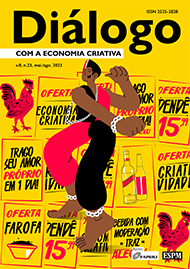Design teaching in the pandemic of COVID-19: perspective of teachers and students in the city of Rio de Janeiro
DOI:
https://doi.org/10.22398/2525-2828.82390-106Keywords:
Design, Teaching, Rio de Janeiro, Pandemic, FuturologyAbstract
Some of the changes in ways of living brought about by the Covid-19 pandemic, despite being announced and emerging since the 20th century, have expanded and consolidated in an unprecedented breadth and pace. This situation increases the demands of facing complex problems, that is, with demands and restrictions in constant change. Since Design is a professional activity that proposes to equate design factors to meet human needs, debates about the challenges for its teaching and practice have intensified. The present work is part of a doctoral research initiated in 2020, which aims to prospect future scenarios for teaching Design, from the perspective of the Covid-19 pandemic. Data collections were carried out, with territorial cuts of the city of Rio de Janeiro (in the period of 2020 and 2021), with controlled follow-ups directed to teachers and students. Positive and negative points and a vision of the future were identified, which lead to a discussion for the continuation of the research.
References
AGÊNCIA BRASIL. Unesco: Covid-19 deixa mais de 776 milhões de alunos fora da escola. Agência Brasil, 2020. Disponível em: https://agenciabrasil.ebc.com.br/internacional/noticia/2020-03/unesco-covid-19-deixamais-de-776-milhoes-de-alunos-fora-da-escola. Acesso em: 20 set. 2020.
ARCHER, B. The need for design education. In: ARCHER, B.; BAYNES, K.; ROBERTS, P. (org.). A framework for design and design education. Design and Technology Association, 2005. p. 16-21.
BONSIEPE, G. Design, cultura e sociedade. São Paulo: Edgard Blücher, 2011.
BONSIEPE, G. Design como prática de projeto. São Paulo: Edgard Blücher, 2012.
BORBA, F.; DUTT-ROSS, S.; DANTAS, A. C. Mobilidade urbana no Rio de Janeiro: diagnóstico a partir da percepção do cidadão. Curitiba: CRV, 2022.
BRASIL. Ministério da Educação. Sistema e-MEC. Brasília: Ministério da Educação, 2022. Disponível em: https://emec.mec.gov.br/emec/educacao-superior/ies. Acesso em: 4 jan. 2023.
BUCHANAN, R. Design research and the new learning. Design Issues, v. 17, n. 4, p. 3-23, 2001. https://doi.org/10.1162/07479360152681056
PAPANEK, V. Design for the real world: human ecology and social change. Nova York: Pantheon Book, 1971.
PEINADO, J.; GRAEMI, A. Administração da produção: operações industriais e de serviços. Curitiba: UnicenP, 2007.
RITTEL, H. W. The reasoning of designers. In: INTERNATIONAL CONGRESS ON PLANNING AND DESIGN THEORY, 1987, Boston. Anais… 1987.
SANTAELLA, L. A crítica das mídias na entrada do século XXI. In: PRADO, J. L. A. (org.). Crítica das práticas midiáticas: da sociedade de massa às ciberculturas. São Paulo: Hackers Editores, 2002. p. 44-49.
SCHON, D. The reflective practitioner. Nova York: Basic Books, 1983.
SIMON, H. The sciences of the artificial. 3. ed. Cambridge: MIT Press, 1996.
WORLD DESIGN ORGANIZATION (WDO). Definição de desenho industrial. WDO, 2018. Disponível em: https://wdo.org/about/definition/. Acesso em: 10 set. 2020.
WORLD HEALTH ORGANIZATION (WHO). Overview of public health and social measures in the context of COVID-19 (Interim guidance). WHO, 2020. Disponível em: https://www.who.int/publications/i/item/overview-of-public-health-and-social-measures-in-the-context-of-covid-19. Acesso em: 11 jun. 2020.
Downloads
Published
How to Cite
Issue
Section
License
Copyright (c) 2023 Paola de Lima Vichy, Ligia Maria Sampaio de Medeiros

This work is licensed under a Creative Commons Attribution-NonCommercial-NoDerivatives 4.0 International License.
The copyright for articles published in this journal belongs to the author, with first publication rights to the journal.
We emphasize that the responsibility for the articles is exclusive to the author(s) and does not necessarily reflect the opinion of the Editors or ESPM.








